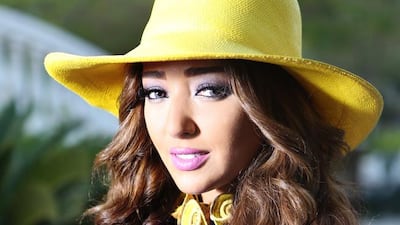After each UAE performance by Jamila El Badaoui, the responses are often the same.
The 23-year-old singer would meet the crowd and be bombarded by the same startled sentiments.
“‘I can’t believe you are not Emirati’ they would say,” she recalls.
“Other times, they will say that I must have been born or raised here. I take it all as a compliment, of course.”
To set the record straight, Jamila – who uses only her first name for her stage moniker – was born and raised in Morocco but owes much of her success to singing Emirati and Arabian Gulf songs with pitch-perfect enunciation.
Speaking from the Mawazine Festival in the Moroccan capital Rabat, Jamila’s home city, she explains that, after growing up in the country’s cultural melting pot, learning the Gulf dialect wasn’t a big stretch.
“Moroccans rarely have problems with understanding or taking on different dialects. If you give us some time, we can have it down 100 per cent,” she says.
“The reason is that Morocco has many dialects of its own, from the classical Arabic to Berber and Amazegh. Each of these are totally different, so we need to pay attention and understand them in order for us to communicate with each other.”
Performing since her early teens, regional music insiders eventually convinced a 17-year-old Jamila to move to Dubai to further her singing career.
With a few years of gigging under her belt – and a short stint living in Bahrain – Jamila announced herself to the region when she reached the finals in the 2012 season of Najm Al Khaleej, a talent show with Gulf-based contestants.
Jamila describes the experience as bittersweet; while happy at the new-found profile, she came face to face with the tough nature of showbiz.
“I must admit that I did think that, once the show was over, my career was set and it was just a matter of moving forward,” she says.
“But – and I am not shy to say this – the show did absolutely nothing for me. Sure, it did raise my profile, but I couldn’t deliver new songs to this new fan base because I had no industry support. I was basically on my own.”
Jamila took the only choice available to her at the time and worked relentlessly, with appearances at regional festivals and events. Each show managed to ease her gnawing self-doubt.
“There were a lot of tough times,” she says.
“I felt like quitting, as I was mentally drained. But whenever I reached the stage, I somehow reminded myself that I was tired, because that’s the price it takes to succeed. Each stage of development demands working hard.”
The determination finally paid off last year when the Dubai-based label Platinum Records – whose clients include Palestinian superstar Mohammed Assaf – signed her up.
The industry support she yearned for finally arrived; Jamila went straight into the studio to record a couple of singles and accompanying videos.
Her debut song, Ya weel hali, released last June, is a standard Khaleeji pop number with Jamila's sensuous vocals perking up an otherwise staid production.
The follow-up, Yegoulou Yegoulou, released in October, is vastly superior as Khaleeji-syncopated beats meet modern clubby keyboard riffs.
The most arresting feature of both songs is Jamila’s deft command of the Gulf dialect, with its distinct phrasing and rhythms.
“It is a really beautiful way of singing,” she says.
“What I love about it is the words used are rooted in poetry. So it has a certain depth that sounds different when it is played on top of an up-tempo rhythm or ballad. It gives a special touch to each song.”
Jamila’s growing success resulted in unexpected reactions on the home front. She says that her new legion of Moroccan fans also think she is Emirati.
“Maybe it’s the way I look or sing, but none of them believe I am actually Moroccan,” she says, laughing.
“I have to actually convince them that I was born and brought up here, and proudly so.”
Any doubt from the crowd was settled with Jamila’s Mawazine Festival performance back in June. She stood proudly in front of more than 100,000 spectators on the Al Nahda stage, the majority of them clutching the national flag.
• Next up on Mawazine Sessions, the Lebanese crooner Wael Jassar


